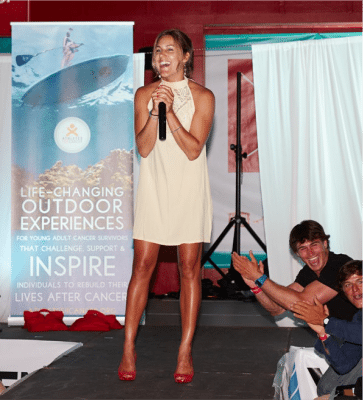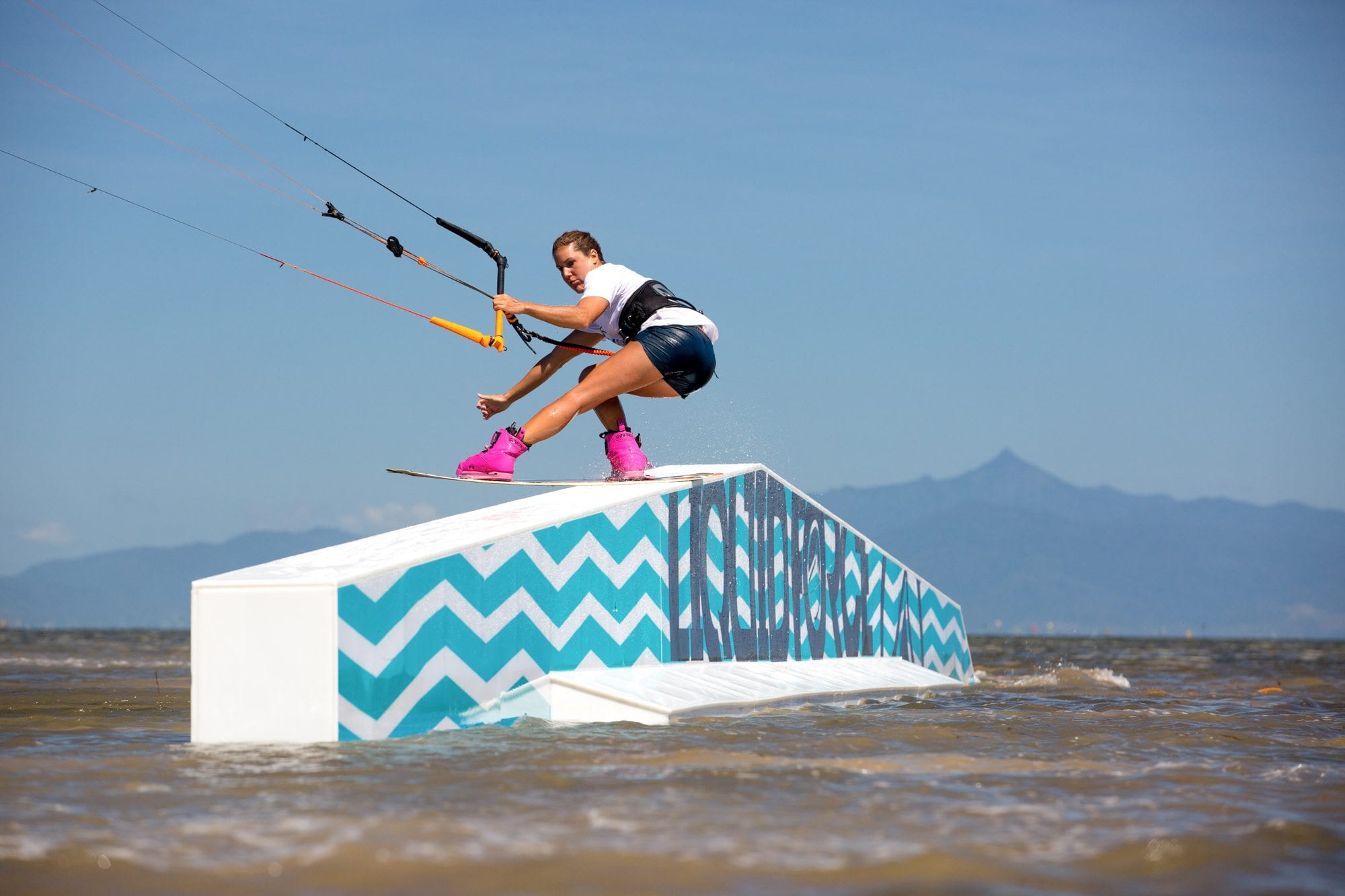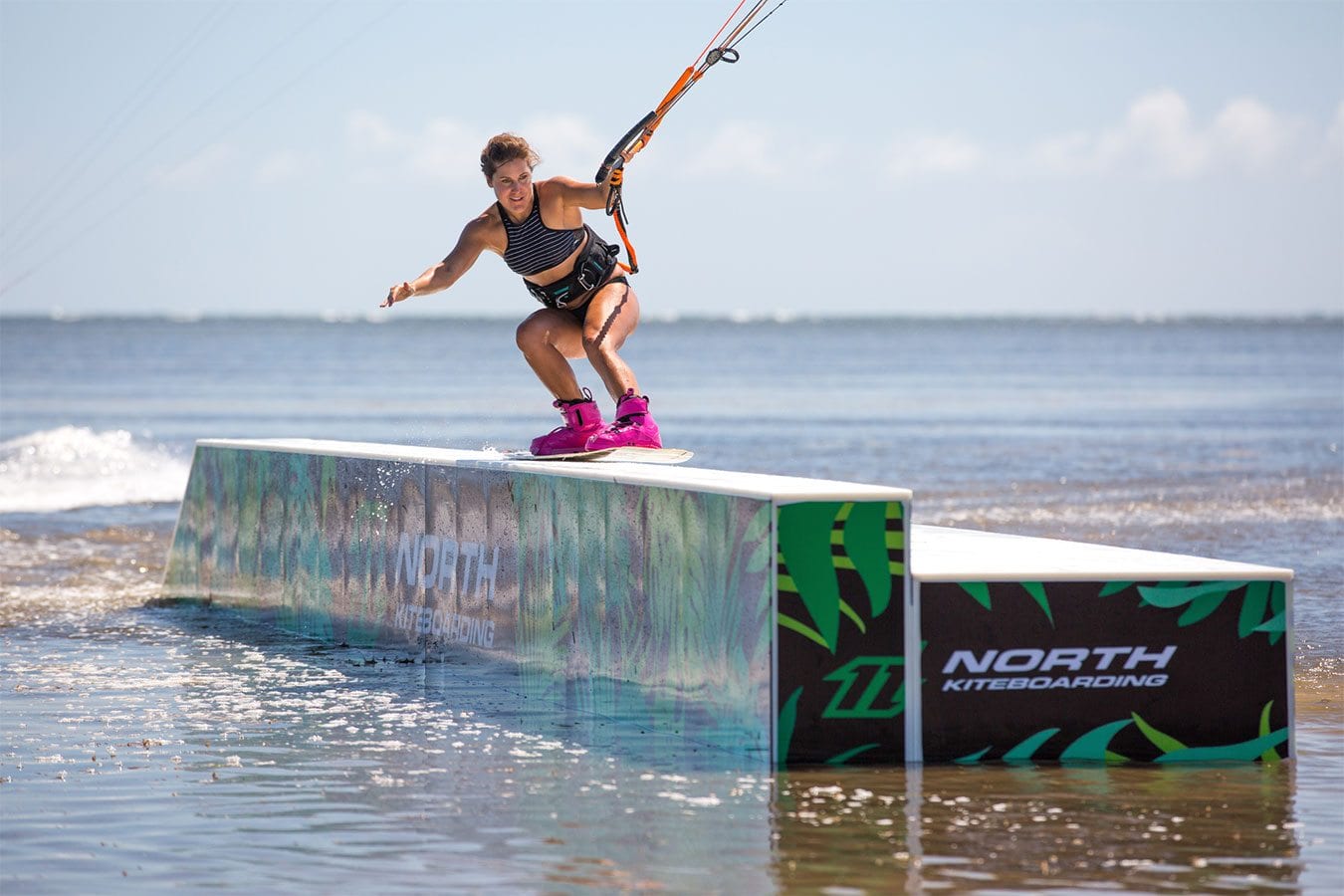Back then it was novel idea ”” bikinis that stayed on. It seems easy enough; nowadays every major surf brand has a women’s line geared towards actual surfing, but in the winter of 2012, Sensi Graves was bootstrapping her way through the launch of one of the first active lifestyle-oriented bikini brands to hit the market. While the romanticism behind entrepreneurship often paints a picture of excitement and massive lump sum payoff, the harsh reality is that startups demand tremendous amounts of time and money with great potential for failure.
It was a pivotal moment; the floor of Sensi’s Maui jungle bungalow rental was littered with half assembled bikinis. Peahi was just across the road and down old Hana highway, her boyfriend, Brandon Scheid, was working at Whole Foods to keep some reasonably priced food on the table and Sensi was on the verge of launching her first swimsuit line. Sensi had penny-pinched two rounds of prototypes and finagled a full line of photos with professional models, but a misunderstanding with her factory meant that in order for the final product to match her photographed catalog, she would be hand assembling crocheted rings onto the bottoms herself. Enlisting the help of Brandon to complete her first collection, she would learn that communication is one of the most essential parts of running a business, as well as having a boyfriend who is good with his hands.
When people ask Sensi how she got her name, she coyly replies in a roundabout way that she was named after a flower. Having grown up in Humboldt County, California ”” Fortuna proper ”” Sensi was the daughter of successful horticultural entrepreneurs. Her mother was a talented ski bum, winning synchronized skiing contests in the 70s, who met Sensi’s father on the side of the road while he was hitchhiking his way through Humboldt. Hiring him to help farm her land, the seeds were planted and three boys and one girl later, the latter named after the illicit staple crop, the Graves were living a very unconventional lifestyle. While her mother passed away when Sensi was 16, Sensi remains inspired by the active, adventurous lifestyle that Mama Graves was committed to. Given her roots, taking risks and striking her own path are perhaps both in her nature and nurture.

Sensi stokes out a stalefish over the pristine waters of Palawan. // Photo Toby Bromwich
If there’s one thing Sensi learned in her communications studies at UC San Diego, it’s that every brand needs a story. The mythology behind Sensi’s swimwear company starts in North Carolina at REAL Watersports. As a sophomore in college, Sensi learned to kite in REAL’s protected waters along with her three brothers. Donning the trademark red jersey, she returned after college to work as an instructor.
After a couple seasons of coaching, Sensi had an epiphany: “I had 20 bathing suits at the time and none of them worked well for surfing and kiteboarding.” Out of this grew her aspiration to make women’s swimwear that would actually stay on and endure the rough waters and full body movements of action sports. If Sensi was an entrepreneur at heart, there was one benefit to be gained from working for the man, the megalith of kiteboarding instruction, and it was the ability to network with high-grade clientele. Sensi taught a number of successful female entrepreneurs whom she immediately bonded with in a mutual connection of friendship and mentorship.
Even with the idea for her bikini company planted in her brain, it wasn’t until a former student, Bella Jones, began introducing Sensi as the owner of a lifestyle swimwear company that it became real for Sensi.
“When it got out into the open I got really nervous. You can’t tell people about your aspirations and not actually follow through.”
Sensi knew it was a product that was needed but was hesitant. However, once Bella started putting it out there, “it was both a burden and relief.” While the value proposition was strong: women need bathing suits to stay on while surfing and kiteboarding, Sensi wasn’t sure she had all the skills to put it into play.
Another kite student turned mentor, Terry Peck-Huge, owned a shoe company and gave Sensi some design books. The books were from the 80s, but they gave her an idea about the fashion industry’s prototype and production process. Terry was a natural mentor who helped Sensi develop a business plan and get the company off the ground. This is when Sensi made her first strategic decision ”” instead of spending a year learning how to sew, she focused on designing the product on paper and hired a local lady in Avon, North Carolina, to
bring her drawings to life.
The spring of 2011 was a very busy time for Sensi. Between teaching kiteboarding lessons and scratching out her first swimwear sketches, she also came up with the idea for a vehicle which would combine a product beta test and media launch for her swimsuit line. Manifested in the form of a charitable swimsuit fashion show at the prestigious Triple-S contest, not only was the event a giant success, but by putting her fledgling brand in the spotlight, the fashion show influenced Sensi’s trajectory in unforeseeable yet portentous ways.

Sensi takes the stage at the first Triple-S fashion show while launching her brand, raising money for KB4C and fortuitously broadening the network of people that would help Sensi Bikinis take off. // Photo Sam Perry
In abstract terms, the fashion show established an interest from within the kiteboarding community which emboldened Sensi to take her idea further. But in concrete terms, the fashion show introduced Sensi to Sam Perry, a professional photographer in attendance. Sam was so impressed with Sensi’s concept that he offered to shoot her entire first swimsuit line for free. The quality of the photos were stunning, and turned Sensi’s hand sewn cottage-style prototypes into the polished line you would expect from an established brand. In one fell swoop Sensi had built a product, created demand and captured high-resolution photographic marketing materials. But the final and most complicated component of launching remained: production of a finished product in sellable numbers.
Sensi began looking for a production house willing to accommodate a small run, but this wasn’t an easy task. A couple of months went by before the charitable component of her fashion show took her to the KB4C event in Hood River, Oregon. Asking around, Sensi got the contact for a Portland-based sewing house that was willing to do a production run small enough for her homegrown operation. Since she was going to have to build another round of prototypes through her new production house, she returned to North Carolina to finish the coaching season while working on a plan to find the money to make her first products. This is when a fortuitous natural disaster intervened.
Evacuating the island as Hurricane Irene unleashed devastation along the East Coast, Sensi and Brandon headed north to New York to stay with co-worker and good friend Rich Sabo’s parents. During their two-week stay, the Sabos, successful entrepreneurs themselves, took an interest in the Sensi Bikini concept and ultimately gifted Sensi the seed money to proceed with her first production run. Sensi talks with a rare blend of enthusiasm and confidence tempered by a humble reluctance to credit herself for her accomplishments; part of this is her self-deprecating nature, the other part, an acute awareness to all the connections and generosity of those who have helped her launch the bikini brand.
When asked about benchmarks of success, Sensi talks about her first online sale as well as a surf trip to El Salvador where she encountered a woman, specifically a non-kiter, wearing one of her bikinis. These real life anecdotes of success are perhaps the most visceral evidence of momentum, but there’s a whole host of digital indicators of growth, like watching the brand’s hashtag pop up in social media all over the world.

Official product testing by Sensi and friends on a surf trip in El Salvador. // Photo Jen Jones
In terms of sales, Sensi’s biggest spike was when the line got picked up by retailing giant Urban Outfitters in 2014. The retail juggernaut opened a smaller retail division for activewear called ”˜Without Walls,’ and although it was a big step up for Sensi, the arrangement only lasted two years before Urban Outfitters mysteriously shutdown the fledgling offshoot’s online store and stopped placing orders. In retrospect, accounting for the hasty retreat, industry followers speculate that activewear wasn’t Urban Outfitters’ target customer. Sensi recalls a tremendous amount of turnover in the buyer’s department and today her Urban contacts are all working elsewhere. While that door is closed for now, she continues to focus on developing new retail accounts.
Sensi has grappled with the concept of success, and while she admits “I don’t feel like I can say I’m on track to be extremely successful, at the same time, I have everything I want. I’m learning to acknowledge how far the company has come and celebrate the little successes and wins along the way.” Sensi tries to set realistic goals that she can accomplish in one or five years, but ultimately, “the plan is to be a company that other people can look up to in terms of environmental responsibility and living a healthy lifestyle.” Sensi Bikinis donates at least 1% of its annual net revenue to charity. For a cash-strapped startup, this commitment is not always easy. After speaking with Sensi, it becomes clear that this donation is anything but a superficial greenwash measure. In fact, it’s part of a greater commitment to subject all her business decisions to a strong moral, ethical and environmental compass.

Product testing under all conditions. // Photo Brandon Scheid
All Sensi products are made in the United States under transparent labor practices and stringent environmental controls. In addition to the core advantage of minimizing the environmental and financial cost of freight, she’s also paying more for her product, which lowers overall profitability. However, strategic decisions like these help Sensi stand behind the product as the face of the company. In terms of hard environmental choices, Sensi stuck to her guns against wasteful protective packaging. While all of her packaging is completely recyclable with labels and hang tags sourced from recycled materials, the bigger issue is plastic. Whether for home delivery or for entry into the retail supply chain, the majority of clothing retailers individually package their garments in plastic bags. The plastic consumption is daunting, but it ensures the customer gets a uniform product and minimizes any risk of moisture, premature wear, wrinkling or hang tag damage.
Even the most environmentally branded retailers out there have done studies and continue to justify their use of plastic, suggesting that the extra shipping from returns of damaged garments outweighs the environmental impact of using it. However, Sensi refuses to accept this and while her product may be at greater risk for supply chain mishandling, she’s never had a complaint from customers that would justify compromising her environmental commitment. Sensi laughs, thinking how odd it is when her retailers open her shipments in a single package, but she likes to think they appreciate the landfill space and the time they save by not ripping into tons of individual plastic bags.
While the environmental sustainability of the product itself is an ongoing concern to which Sensi continually encourages her supply chain to source reused and recycled fabrics whenever possible, one of the greater challenges is how Sensi navigates the messaging of her bikini company through the minefield of an industry infiltrated with conflicting viewpoints on appearance, sex and body image as marketing tools. The swimsuit by its very essence, both reveals and protects the female body, so even an active lifestyle swimwear brand has to walk a fine line. While Sensi makes the easy distinction between her action sports product and the broader category of non-functional beach bikinis designed for pure fashion, at the end of the day, she knows that in addition to performance, her customers “want to feel sexy in their bikini.” On one hand, the dance isn’t so difficult because
Sensi’s activewear messaging is attempting to promote the idea that “it doesn’t really matter what your body looks like, so long as you go out and be active, because this by itself will improve your life.” And according to Sensi, “the idea behind our bikinis is to give women a tool to do that while subtlety changing the message about bodies in general to embrace an all-encompassing and empowering image.”

Sensi Bikinis: comfortable just about anywhere. // Photo Vincent Bergeron
Promoting this message is easier said than done. Sensi recounts an Instagram post of one of her models featured in a Miami trade show. “She was very thin not anorexic,” but there were 75 Instagram posts with people posting unnecessary troll bait, like “please give this girl a hamburger.” Blowback from her marketing has been anywhere from her models “not having big enough boobs to complaints about girls with larger breast sizes being unrelatable.” Sensi finds this type of criticism challenging, particularly while being the face of the company and going on record as personally promoting a healthy and active lifestyle. “At first it was scary to have people disagree with you, but it was something I had to get over. Not everyone is going to agree with you and it’s taught me to have a stronger voice and stand behind what I believe in.” According to Sensi, “the word ”˜empowering’ is often overused when it comes to female marketing, but at our core, we are really all about building each other up.” Over time she has learned to weather any criticism by standing behind her team of ambassadors, “an inspiring group of women who are doing awesome things while wearing Sensi Bikinis.”
While starting her own company hasn’t been easy, entrepreneurialism has brought tremendous synergy to her progression in kiteboarding. Originally reluctant to pursue professional kiteboarder status, Sensi is currently one of the top female riders within kiteboarding’s parkstyle movement. Recently, Sensi placed second at a slider event in Puerto Princesa, Palawan, an accomplishment that demonstrates her inner competitive drive.

Sensi Graves demonstrates her own blend of rail style on the rooftop feature at the Blue Palawan slider event. // Photo Toby Bromwich
Sensi is quick to point out that she learned many of her foundational parkstyle skills from her boyfriend, Brandon Scheid. Aside from being nothing short of an excellent kite coach, he has always encouraged her to push herself, travel and participate in photo shoots. Little did she know, when Sensi moved to Hood River to be closer to her production and fulfillment house, she was unwittingly tracing her mother’s path.

Sensi’s mom, “a total action sports babe,” scores front and center on the cover of an 80s Skiing magazine.
As an avid windsurfer in the 80s, her mother also spent her summers in the Gorge. Thumbing through her mom’s travel logs, Sensi recounts stories of solo hitchhiking through America and anecdotes of how her mother was the first one on and last off the mountain, often putting her male friends to shame. The latter is a quality that Sensi has embodied in her kiteboarding while bringing a fluid yet aggressive style to the rail.
When Sensi looks back, “Bikinis were a no-brainer. It was clear from the start that this was the business I would design my life around.” With freedom amongst her core values, Sensi has always been determined to avoid the ties of a 9-to-5 job and focus on what’s important to her. In between her hectic travel schedule for swimsuit and kiteboarding shoots, entrepreneurism has taught her a great deal about small business along with her greatest lesson yet:
“Getting what you want is really just as simple as not being afraid to ask.”
Sensi’s first sponsorship in kiteboarding was more of a trade, working as the social media manager for Liquid Force in exchange for kites and boards. But as she progressed in her riding, she became more confident in the value of her riding skills. According to Sensi, “People say no, but that is the worst that can happen.” When Sensi eventually requested a legitimate sponsorship, Liquid Force said yes and since then, owning her own business and representing Liquid Force as an athlete couldn’t compliment each other better. “They both require a lot of the same skills: self-motivation, discipline and the relentless pursuit of your goals.”
Words by Brendan Richards
This story first appeared in The Kiteboarder Magazine’s SUMMER 2016 issue. Want more? Subscribe here.



